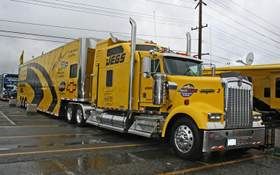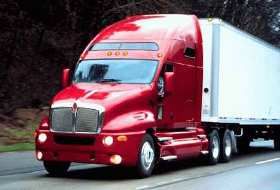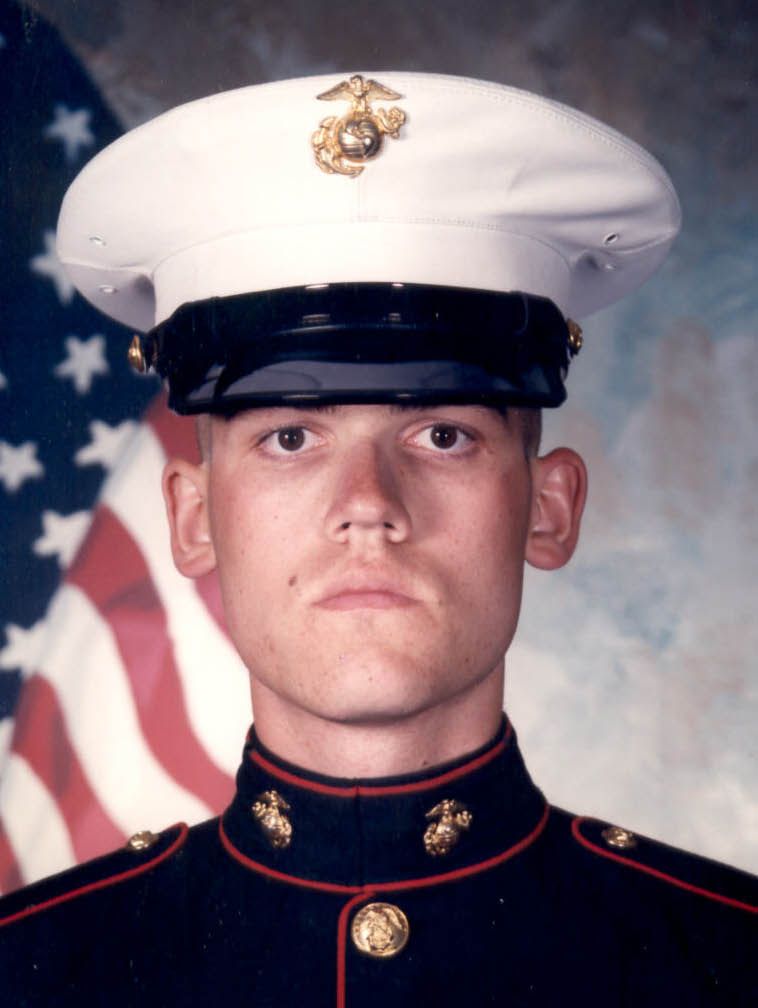Halliburton: Overseas Work
Topic 8535 | Page 1
I wish I could help you with this but I don't know the first thing about overseas jobs.
I think you might find flatbed to be a lot more challenging and interesting. I don't know if you'd consider that extreme, but I know a 40,000 pound coil if not secured properly will come through the cab and crush you like a bug when you hit the brakes. That's pretty extreme!
Almost every load you have to secure is different from the rest and you'll have to come up with safe, effective, legal ways of keeping everything on that trailer. It's far more interesting and challenging than dry van or refrigerated.
Dry Van:
A trailer or truck that that requires no special attention, such as refrigeration, that hauls regular palletted, boxed, or floor-loaded freight. The most common type of trailer in trucking.
I can't tell you anything about trucking itself as I'm not yet a driver, but I've spent some time overseas as a civilian contractor. I've seen KBR around, they are HUGE, but I've never worked for them. What I can tell you is to get everything in writing and do not assume anything. This is even more important overseas than in the USA because US laws don't always apply to your contract. Get details on your travel and insist that they pay for all travel expenses including overweight baggage, and find out how often they'll allow you to return home on their nickel. You should have a current passport, and they should pay for all visas and work permits etc. Get details on health and disability insurance, they should pay for it. Vaccinations too if needed. Get lots of details on housing and local transportation, you could end up sharing a bedroom with 4-5 guys who don't speak your language, and who don't have much concern for personal hygeine. Try to get single housing where they pay for rent, utilities and maintenance, hopefully in a secure, walled and guarded compound. What I'm trying to say I guess is that not only should everything be in the contract but everything should be discussed and negotiated. I promise you they'll never offer you more than you ask for, so ask for the moon, you might be surprised how much they'll move. I've contracted in Iraq, Afghanistan, Uganda, and I've been in Saudi Arabia for the past 14 months. Find out if and how DOT regs and maintenance apply where you're going. Hope this helps, and I welcome any questions!
DOT:
Department Of Transportation
A department of the federal executive branch responsible for the national highways and for railroad and airline safety. It also manages Amtrak, the national railroad system, and the Coast Guard.
State and Federal DOT Officers are responsible for commercial vehicle enforcement. "The truck police" you could call them.

Rich- in the future, do you plan on trucking overseas?
I remember years ago, maybe Iraq, a convoy, maybe truckers would not drive. They told the Commander it's too dangerous, we need a very strong military presence and escort.
At the time I asked a soldier who was in that area- he said the people that disobeyed the order were correct- it was too dangerous to travel there.

I heard that report too, they were concerned about roadside bombs (made from 155mm howitzer ammo abandoned after the first gulf war).
I've had about enough of the sandbox part of the world. I thought Saudi Arabia would be different but its really not. I hate to spout statistics, but a few things I've found out here include the fact that 30% of all hospital beds here are occupied by automobile crash victims. Saudi Arabia has the 5th highest highway death rate per 100,000 people, in the world. I drive about 1000 miles a week to/from work in an SUV, and I've lost track of the number of dead bodies I've seen lying on the roadside next to crashed cars. 40% of automobile drivers have no license or training. Most of the big rig crashes I've seen here are single vehicle. Most truck tires are recaps, and most trucks appear to be well overweight. A few are jacknifed due to traffic, but most guys just run off the road and end up on their side. None of them wear seatbelts, so many die. There are no enforced speed limits, weight limits, HOS , and looking at the rigs I'd have to say that safety is exclusively a first world concept. Despite all the oil money, Saudi Arabia is not a first world country. Nope, I'm going to do my driving in North America.
HOS:
Hours Of Service
HOS refers to the logbook hours of service regulations.OWI:
Operating While Intoxicated

I love hearing double-takes over the phone, followed by Dollar Sign Eyeball sound effects. Got a call back from a recruiter for a company that handles a lot of DoD work (something I am interested in) and I was asking him some basic questions about teams. He seemed quite bored until I uttered the magic phrase, "active TS/SCI Full-Scope Poly Clearance". He was suddenly falling all over himself to hire me. Only thing stopping me is I want to go teams, and my dads Clearance is inactive. But really, that shouldn't be a problem if the company is this hard up for Cleared Drivers.

I do not know much about the rest of the world but I know that the roads in Iraq are pretty scary. Once saw two rigs smash into each other head on through my rifle scope. I thought they were playing chicken but nope Just to dense to get out of the way. Drivers were fine but the rigs burned to the ground.
Freeways in Iraq the lanes change at any given time. Say the right lanes are cordoned off due to a expoison or risk of one. Well seeing how there are none or next to no traffic laws the left lanes then become a two way road. Don't even get me started on road maintenance. Pot holes the size of cars all over.
I know a empty tanker is more likely to explode than a full tanker from watching them get hit by roadside bombs.
I know that the Iraqi Army is some of the most complacent fighting force in the world. I would never trust them with my life.
Try Kuwait for KBR, they are at least more of a modern nation with some civility.
New Reply:
New! Check out our help videos for a better understanding of our forum features

















Preview:








 TT On Facebook
TT On Facebook
I'm coming up on my first year of OTR driving with Swift. At this point I can honestly say I don't want to be a dry-van driver my entire career. I have a perfect record (Platinum level driver on the internal Swift ranking) and I can handle the day to day. I just think I'll end up getting bored doing this. So I'm looking at jobs that kind of count as the "extreme" side of trucking. And driving for Halliburton in the oilfields overseas seems like a fit. Has anyone ever worked for Halliburton/KBR and has any advice on what experience I would need when I apply. The job postings don't mention a minimum amount of driving experience needed, but I'm sure they have a number they like to see. Also, should I look at working at a state-side oil company first, or will Halliburton train me to work a tanker?
OTR:
Over The Road
OTR driving normally means you'll be hauling freight to various customers throughout your company's hauling region. It often entails being gone from home for two to three weeks at a time.